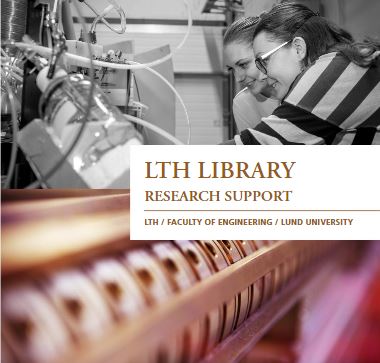Research support
As a researcher you can receive support from the library during the different parts of the research process. Please contact us at the email bib@lth.lu.se to book an individual session or workshop for a group.
You can read more about various topics below. Please contact the library if you would like to book a librarian for further assistance.
LUCRIS is short for Lund University Current Research Information System, which is the Lund University system for research information. Scientific publications, information about individual researchers, groups and projects, and other research related activities are presented in the Research Portal, which is the public interface for LUCRIS. In LUCRIS this is called research output.
The library organizes seminars, workshops, and individual sessions regarding LUCRIS. We can show you how to register your publications, projects, and other research activities as well as how to update your presentation page to a minimum level. You can also contact us if you want to obtain statistics (bibliometrics) from LUCRIS, either for the individual researcher or for an entire department.
Please see links below to the Staff Pages where you can read more about LUCRIS:
We do task-based information searches within different subjects, for instance before a project application, for a literature review, or at the start of a new project.
We choose relevant sources of information and lay out a search strategy based on your need of information and in joint consultation with you. We then carry out the information retrieval and put together the result in a search report. You assess the search result and decide if it is good enough, or if the search strategy needs modifying and a new search is required.
Contact us if you want help with a systematic search!
There are many reasons to make your publications open access, so that they are freely available online. Two reasons are that it makes it possible for everyone to read your work, even people outside the academia, and a lot of research funders will only finance your research on condition that the results are published open access.
There are different ways of making your publications open access:
- Publish in journals with publishing agreements
Lund University have publishing agreements with most of the larger scientific publishers. These agreements usually mean that researchers and doctoral students from Lund University can publish open access in these publishers’ journals without having to cover the publishing fees by themselves.
- Publish in an open access journal
Lund University will cover article processing charges when you publish in an open access journal (i.e. a journal where all articles are always made freely available). Fees for open access books and book chapters can also be covered.
Financial support when publishing on the Lund University Library website.
- Self-archiving your publication
If you have published in a subscription journal not covered by a publishing agreement, it is likely you can self-archive your article. This means you upload an open access copy of your article to an archive, like LUCRIS for example.
Most scientific publishers allow self-archiving, but their conditions for this vary. It is common that the author manuscript version (= same text as the published version, but without the publisher’s layout and page numbers) can be uploaded, sometimes after a delay period that is called embargo.
On Sherpa Romeo's web page you will find information about journal and publisher policies.
Research data is data collected or created to serve as a foundation for analyzes and validation of research results. The data can consist of analog or digital information, such as laboratory reports or software. There are Swedish laws and regulations you as a researcher need to consider when handling research data. Many research funders also have requirements regarding the handling of research data, like making it available and having a data management plan.
A data management plan (DMP) is a document that provides a framework for what should happen with the research data during and after a research project. Lund University's tool for data management plans is called DMP Online. The tool helps in creating and updating your data management plan.
At Lund University, you have access to EndNote as a reference management program. You can download EndNote through the Software Center. With a reference management program, you can create a reference library and easily reference to sources while you write.
Read more about reference management and reference management programs on our page for reference management.


